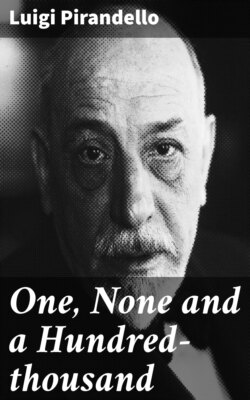Читать книгу One, None and a Hundred-thousand - Luigi Pirandello - Страница 20
На сайте Литреса книга снята с продажи.
VIII. Out into the Open
ОглавлениеTable of Contents
Come, now, you need not be afraid that I am going to wreck either your furniture, your peace or your love of home.
Air! Air! Let us leave the house, leave the town. I am not saying that you can put any too much confidence in me; but come, do not be afraid. Come with me to where the street with its houses breaks into the open country.
Yes, this is a street. Are you really afraid that I may tell you it is not? Street, street. A flint-stone street; look out for the flints. And those are lamp-posts. Come on; you are safe.
Ah, those distant sky-blue mountains! I say "sky-blue," and you, too, say "sky-blue," do you not? We agree. And that near one there, with the chestnut grove—they are chestnuts, aren't they?—do you see how we agree?—of the cupuliferous family, with a tall trunk. Castagno marrone.* What a huge plain down there ("green," eh? for you and for me, it is "green;" we will say that it is; how marvellously well we understand each other); and in those meadows yonder, look, look, what a blaze of red poppies in the sun!—How is that? Red babies' hoods?—Well, well, I must be blind! Right you are, red woolen hoods. They looked like poppies to me. And yet, that red cravat of yours—How pleasant it is out here in the blue and the green, in the cool sunlit air of the open spaces! So you are doffing that old felt hat, are you? What, perspiring already? Well, you are fairly stout, you know, Lord bless you! If you could see the little black and white squares on the seat of your trousers—Come, off with your coat! You can do without it.
[* Castagno and marrone are the two Italian terms for chestnut, the marrone being the larger variety.]
The country! A restful change, eh, this peace? You feel yourself relaxing. Very good; but can you tell me where it is? I mean, peace. No, no, don't be afraid! Does it really seem to you that peace is to be found here? Let us understand each other, for heaven's sake! Let us not do anything to spoil our perfect agreement. All that I see here, if you will permit me to say so, is the thing of which I am conscious in myself at this moment, a tremendous sottishness, that renders your face, and my own as well no doubt, those of a pair of blessed idiots, but which we attribute to the earth and to the plants, since they appear to live for the sake of living, and could only go on living in such a sottishness as this.
Let us say, then, that what we call peace is to be found within ourselves. Doesn't it seem so to you? And do you know where it comes from? From the very simple fact that we have just now left the town, that is, a world that is built—houses, streets, churches, squares—not for this reason alone, however, because it is built, but also because we no longer live for the sake of living, like these plants, without knowing how to live, but rather for something that is not and which we put there, for something that gives meaning and value to life, a meaning, a value which here, at least in part, we succeed in losing, or of which we recognize the grievous vanity. Hence comes your languor and your melancholy. I understand, I understand. Let-down of nerves. Afflicting need of self-abandonment. You feel yourself relaxing, you abandon yourself.
